We use cookies to ensure that we give you the best experience on our website. If you continue to use this site we will assume that you are happy with it
How Can I Find Out if I Have a Warrant? Run This Quick Warrant Check
 Written by Background Check Repair
Written by Background Check Repair
Criminal Records | April 29, 2024
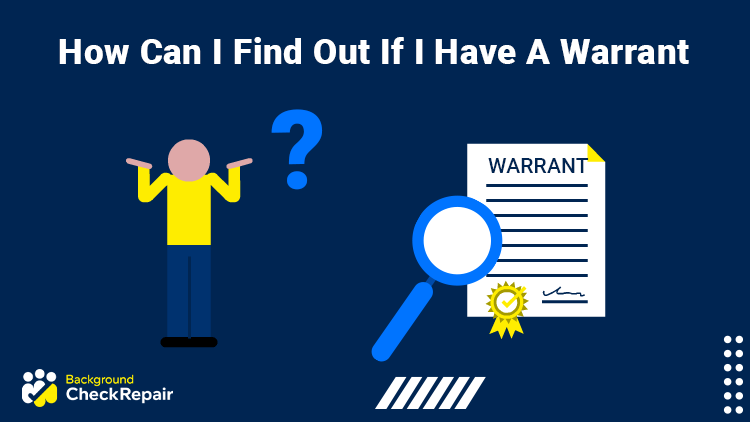
Table of Contents
How can I find out if I have a warrant?
Regardless of the reason for asking this question, knowing whether or not there has been a warrant issued against you isn’t as hard as you might think.
First, run a quick warrant check using the free search bar at the top of this page. This should bring up any outstanding warrants in a just few minutes.
But, in addition to using a background check service, there are several other methods that individuals can use to figure out if there is an active arrest warrant in their name.
In fact, unless the warrant is sealed, anyone can answer how can I find out if I have a warrant by following the guide below.
How Can I Find Out if I Have a Warrant?
After an incident that involves law enforcement, many individuals will be unsure of where they stand from a legal point of view. When this happens a common question is, how can I find out if I have a warrant?
First, there are tons of misconceptions surrounding warrants, how they work, and when they are issued. The laws surrounding warrants will vary slightly from state to state but in general, there is more than one kind of warrant.
The type of warrant will dictate the legal process that will follow.
Arrest Warrants
When most people ask, how can I find out if I have a warrant, they are normally referring to an arrest warrant.
An arrest warrant is issued when an individual has been charged with a crime and the nature of the crime makes the individual a potential danger to the community. When this happens the individual will be arrested by law enforcement so that the charges can be brought against them and the criminal proceedings can begin.
However, individuals who have had charges filed against them will not necessarily have a warrant for their arrest. An arrest warrant is only issued by a judge if there is evidence that the individual is a danger to the community in some way.
This is especially common with violent crimes or other serious crimes such as homicide, serious drug charges, etc.
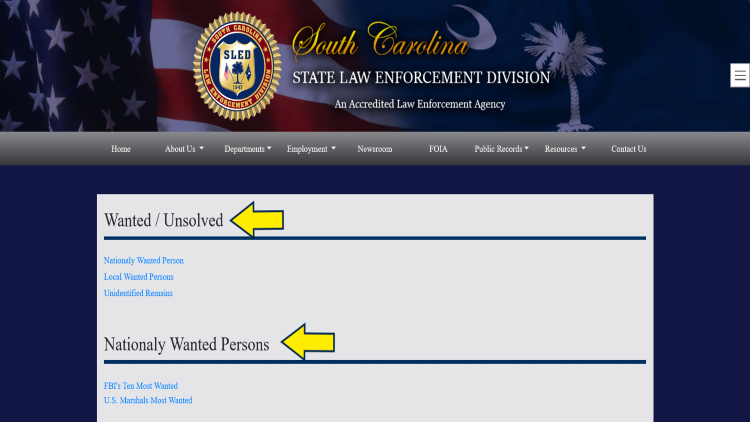
The South Carolina Law Enforcement Division offers links on its website that can be used to find arrest warrants, both locally and nationally.
Individuals who have been charged with lesser crimes such as various financial crimes, or low-level misdemeanors will not have a warrant issued. Instead, the individual will receive a court summons with the date of their hearing on it. During this hearing, charges will be brought against the individual.
Besides arrest warrants, most jurisdictions also have bench warrants as well as search warrants.
Bench Warrant
A bench warrant is a specific type of arrest warrant that is issued after an individual has violated a court order such as failing to appear in court on the specified date after receiving a court summons.
This is one of the reasons that most individuals are served legal documents, rather than receiving them in the mail. Individuals could potentially claim they never received the court summons if it is simply mailed, whereas it is easy to confirm if a court document was served and signed by the individual.
Bench warrants can be fairly serious and can easily result in additional charges being filed against the individual besides the charges they are already facing.
Search Warrant
Search warrants are issued when an individual is suspected of committing a crime and hiding evidence of that crime in a specific location. Search warrants are commonly executed on an individual’s place of residence.
For example, if a law enforcement investigation leads investigators to have reason to believe that evidence regarding a serious crime is being held at an individual’s residence, law enforcement officers may ask a judge to draft a search warrant so that this evidence can be obtained.
How To Check if I Have a Warrant: 2 Ways
In general, there are a few ways that individuals can find warrant information on themselves. One of the easiest methods is to perform a comprehensive background check on yourself using a private background check service that offers a 7-day free trial background check.
This will not only give individuals an idea of what is on their criminal record but can also identify any court documents that have their name on them, such as documents from criminal charges that have been filed against the individual.
Individuals should also keep in mind that unless they committed a federal crime and possibly have a federal arrest warrant, those warrants are generally issued at the county level. This means that the evidence of the warrant will likely be found in county criminal court records, or with the sheriff’s department.
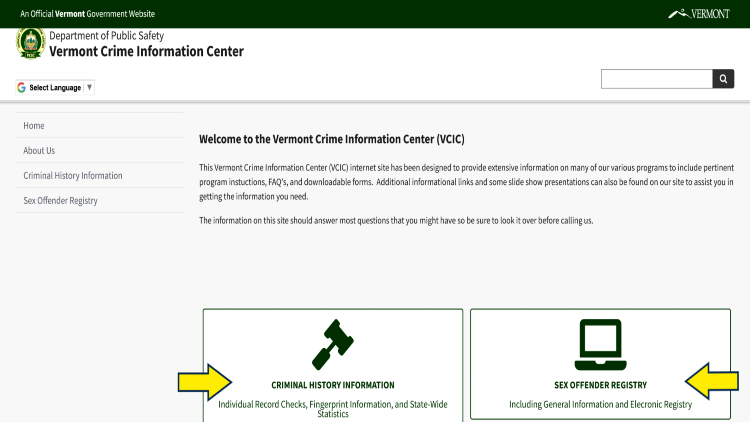
In Vermont, the Crime Information Center is part of the Department of Public Safety, while in other states, background checks may be organized and managed by state police or the Department of Justice.
Besides using a background check service there are two other recommended methods that involve contacting the agency that would have issued the search warrant. In general, executing an arrest warrant can be a dangerous situation for law enforcement officers.
Obviously, individuals who are about to be arrested are capable of committing dangerous acts to avoid the arrest, which may put an officer’s life in danger. Because of this, sheriff departments would ideally want individuals to surrender themselves to law enforcement so they can be apprehended calmly without risking anyone’s safety.
Most sheriff departments heavily encourage individuals to surrender themselves and will often have a phone number that individuals can call to check if they have an active arrest warrant. Individuals in this situation should look into contacting their local sheriff’s department to avoid additional charges being brought and to make the general process as smooth as possible.
Many individuals may be uncomfortable with contacting the sheriff’s department directly and will be looking for other methods to confirm their warrant status.
What is likely the best, but also most expensive option, is to contact a lawyer about the situation. A criminal defense attorney will be able to contact various law enforcement agencies on the behalf of their client and find out their arrest warrant status.
This is the preferred option as an attorney will be able to get ahead of the legal process and arrange a situation that is safe for all parties for the individual to be arrested by law enforcement.
Conducting an Online Warrant Check
Many individuals look for an online warrant check. Unfortunately, law enforcement agencies generally do not maintain databases on individuals that have active warrants. Not only would maintaining such a database be expensive and tedious, but individuals could potentially use this information against law enforcement and flee the county where they have an active warrant.
The closest thing individuals will find to an online warrant check is an online background check service.
Doing a Federal Warrant Search
Some individuals might be concerned they have an active federal warrant and will look for a federal warrant search to confirm this information. Federal warrants are fairly rare and most individuals will have nothing to worry about.
Federal warrants are only issued for individuals who have committed serious crimes at the federal level. Even serious crimes like homicide or drug charges will not be considered federal crimes unless the crime involved crossing state lines.
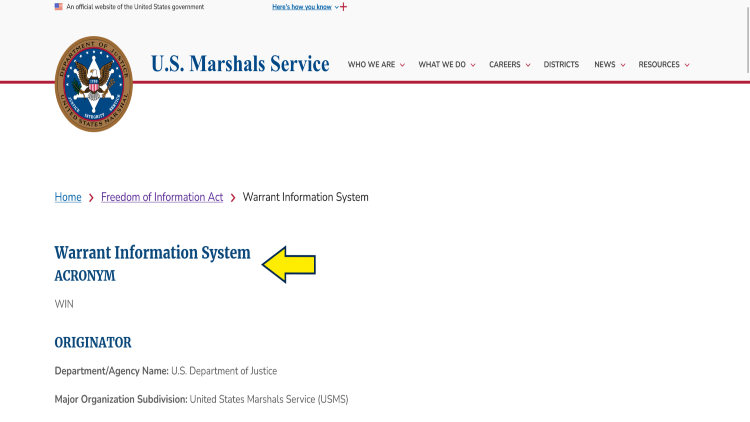
The US Marshals Service maintains the federal warrant database, but limits access to this information to law enforcement.
Currently, there is no federal warrant search that can be used by the general public. The only database that tracks active federal warrants is maintained by the U.S. Marshall service and is available for internal use only. Individuals can learn more about the federal Warrant Information System1 on the website of the US Marshals.
How Can I Find Out if I Have a Warrant? Do Warrants Show Up on Background Checks?
Some individuals worrying about a potential warrant while applying for jobs will want to know, do warrants appear on background checks? Warrants will sometimes show up on background checks but only on specific kinds of background checks.
The vast majority of employers perform background checks on applicants these days using private background check services. These services are generally limited by the laws of the FCRA2 state laws regarding background checks, and can only search for information that is publicly available.
Since criminal records are considered public due to the freedom of information act,3 this is rarely a major issue and all the important information that employers will want to know is available. However, arrest warrants are not always considered public information and thus a typical background check will generally not be able to uncover any active arrest warrants for an individual.
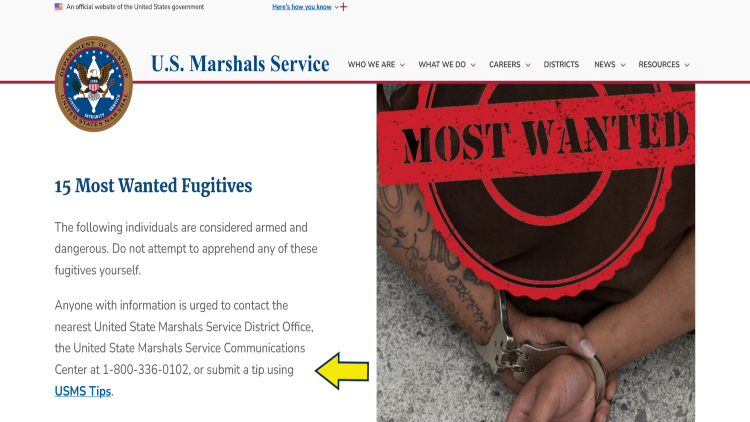
The most wanted fugitives on the US Marshals Service list are extremely dangerous and armed criminals.
There is a notable exception, however: official background checks. Whereas most private employers rely on private background checks, jobs in the public sector such as teachers, or government employees will be subject to an official state and federal background check and because of this, one of the things that may come to mind is what is included in a federal background check?
Federal background checks are far more thorough than private checks as they do not have the same restrictions on what they can check. Not only will sealed information be present on an FBI background check4 but warrant information will also be present on the check.
Can You Pass a Background Check With a Warrant?
Is it possible to pass a background check if you have an outstanding warrant? Most times, yes.
Very few private businesses will perform an FBI background check on individuals and will rely on private background check services. As mentioned, a private background check will not reveal any arrest warrants.
You don’t have to worry about passing a background check. It is important to keep in mind that bench warrants won’t show up on a private background check, but the initial charges will be present on the check.
Will a Probation Warrant Show Up on a Background Check?
Although most warrants will not appear on a background check when asking, will a probation warrant appear on a background check, the answer is slightly different. A probation violation is considered a crime so there will be a record of the probation violation that resulted in the probation warrant. This record is likely to show up on a private background check.
No matter the type of warrant an individual has, it is always a good idea to know how to do a background check on yourself for employment before applying for a job that requires a criminal background check.
How To Find Out if Someone Is Wanted by the Police for Free
Some individuals will want to know how to find out if someone is wanted by the police for free. The difference between someone being wanted by the police and having an arrest warrant is a common source of confusion.
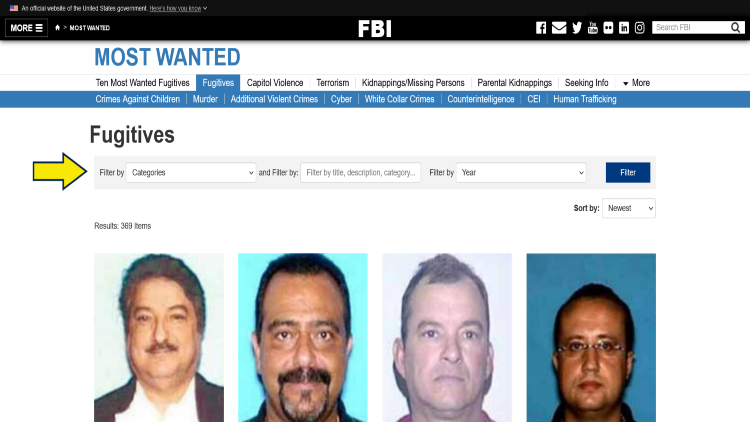
Fugitives on the FBI’s Most Wanted list can be searched using names or categories.
Basically, someone who is wanted by police will not necessarily have a warrant issued for them in most cases. Most individuals that are wanted may be suspected of having committed a crime or being an accessory to a crime, but there is not enough evidence to file the charges necessary to arrest them.
On the other hand, someone with an arrest warrant will have had a formal charge filed against them by a judge.
There is no database that includes all individuals that are wanted by law enforcement, but individuals can contact their local law enforcement agency to find out if they publish their own wanted list. There is also the FBI wanted list5 as well as the Federal Marshal wanted list.6
Free Warrant Search by SSN
Another common question from those trying to learn if they have a warrant is if there is a free warrant search by SSN.
As mentioned, the most reliable way to find out about an active warrant is to contact local law enforcement and inquire using the name of the individual, in this case a SSN is not necessary.
Where Can I Found Out, Do I Have a Warrant?
Warrants are only issued for serious crimes and in most cases, a warrant will be served immediately. It is a fairly rare occurrence that an arrest warrant is issued and the individual is simply unaware of it for weeks at a time.
Arrest warrants are taken very seriously and tend not to simply float around until law enforcement identifies the individual on sheer luck, law enforcement will quickly and aggressively seek out the individual and arrest them.
Sheriff Warrant Lookup
These days, in an effort to avoid dangerous situations, some counties will have a sheriff warrant lookup.
This is a rarely searchable database and instead will be a phone number or location where individuals can safely surrender themselves if they believe they might have an active warrant.
How Can I Find Out if I Have a Warrant?
Need to know how can I found out if I have a warrant? Perform a background check on yourself, contact the local sheriff’s department and ask about checking on active warrants, or contact and explain the situation to a lawyer who can find out on the individual’s behalf.
How To Find Out if Someone Has a Warrant Online for Free
Individuals who are looking to find out if someone besides themselves has an active arrest warrant will have very few options. They can potentially run a background check on the individual but this is unlikely to turn up any warrant-related information.
Some states allow individuals to request warrant information from the local sheriffs, but the majority of states will limit this practice to individuals asking about their own warrants, rather than the warrant of someone else.
How To Find Out if You Have a Warrant
People who are interested in learning how to find out if you have an outstanding warrant can learn by performing a background check or contacting the sheriff’s department of the county where the warrant would have been issued.
Ideally, contacting a lawyer to check for you is the safest but most expensive option available.
How To Check if You Have a Warrant
Most warrants are served immediately so the window in which someone has a warrant but hasn’t been arrested is very short. However, individuals can contact the local sheriff’s department and ask if they have a warrant out for their arrest.
Some jurisdictions allow for individuals to check warrant information on individuals besides themselves but this is fairly rare.
How To Find Out if You Have a Warrant for Free: Federal Arrest Warrant Search
The only free way to find out if you have a warrant is to contact the sheriff’s department which would have filed the charges in court that led to the warrant. This can be done over the phone in most cases or by going to the sheriff’s department.
Felony warrant searches in Texas will be limited to background checks. There is no online warrant database that is accessible by non-law enforcement.
Although there are some apps that claim to be capable of searching for warrants, these are likely simply companies that perform criminal background checks, rather than specific warrant checks which do not exist.
The federal arrest warrant search system is maintained by the US marshal’s office and is only available to federal marshals for specific investigative assignments.
Not knowing if you have a warrant out for your arrest can be a nerve-wracking experience that will leave individuals unsure of where to turn to.
Although it is possible to search for warrants using a background check, individuals with the question, how can I find out if I have a warrant, should ideally contact a lawyer immediately who can help guide them through the process and make the necessary inquiries.
References
1Warrant Information System. U.S. Marshals Service. Retrieved November 26, 2022, from <https://www.usmarshals.gov/freedom-of-information-act/reading-room/warrant-information-system>
2Fair Credit Reporting Act. Federal Trade Commission. Retrieved November 26, 2022, from <https://www.ftc.gov/legal-library/browse/statutes/fair-credit-reporting-act>
3FOIA.gov – Freedom of Information Act. Retrieved November 26, 2022, from <https://www.foia.gov/>
4Rap Sheets (Identity History Summary Checks) — FBI. FBI. Retrieved November 26, 2022, from <https://www.fbi.gov/how-we-can-help-you/need-an-fbi-service-or-more-information/identity-history-summary-checks>
5Fugitives — FBI. Retrieved November 26, 2022, from <https://www.fbi.gov/wanted/fugitives>
615 Most Wanted Fugitives. U.S. Marshals Service. Retrieved November 26, 2022, from <https://www.usmarshals.gov/what-we-do/fugitive-investigations/15-most-wanted-fugitive>
